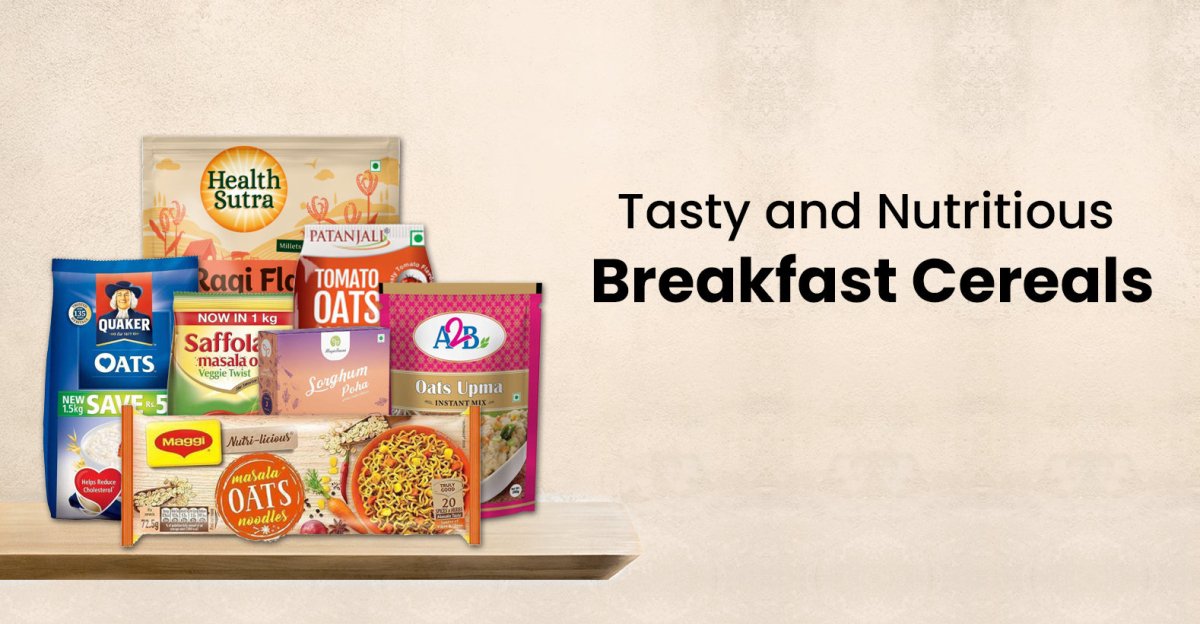An Ultimate Guide To Starting Your Day With Power-Packed Cereals:
Breakfast is the first and most important meal of the day. The first meal of the day nourishes and energizes your body and mind. Though often skipped, breakfast is a meal that increases productivity and keeps you fit. Breakfast is cereal, fruits, and milk, along with many other organic, nutritious food items.
Organic food is a source of the great strength your body needs. This blog will explore the numerous health benefits of eating breakfast, particularly when cereals and organic foods are included.
Why Breakfast Is Important?
Breakfast consumption is similar to "breaking the fast." Breakfast provides the body with the energy it needs for the day as well as the energy it used up during the night. In actuality, those who skip breakfast frequently complain of having less physical and mental vitality. It helps to eat breakfast. Breakfast is beneficial:
-
Increase your energy levels
-
Sharpen your mind and memory
-
Manage your hunger later in the day
-
Breakfast cereals for weight loss
-
Boost your immune system's strength.
You can add organic baby items, cereals, and fresh fruits to your breakfast to make it even healthier.
Different Kinds of Healthy Breakfast Cereals Online:
Cereals are a popular breakfast item and come in a variety of flavours. It is easy to use and convenient for those who lead busy lives. Furthermore, because it contains a high fibre and protein content, it can be consumed in varying amounts to promote fullness. The great thing is that there is a wide range of healthy cereals available, including do-it-yourself options.
Oats:
Oat is a nutritious breakfast cereals. Before being consumed as oatmeal or porridge, oats are usually rolled or crushed. Oats are high in fibre and essential nutrients because they are whole grains. Oatmeal is a versatile food that can be prepared in a variety of ways. You can boil it with water or milk before topping it with fresh fruit, cinnamon, or nuts. Overnight oats can also be made, and they can be soaked in milk or yoghurt for several hours before eating for breakfast.

Muesli:
Muesli is a form of Cereal that is both nutritious and tasty. Typically, it is made with rolled oats, seeds, nuts, and dried fruit. Muesli is the same as granola in that it is eaten raw or unbaked. Furthermore, it typically does not contain any added oils or sweeteners. Because of the combination of whole grains, nuts, and seeds, muesli is a good source of protein. It also contains a lot of fibre, vitamins, and minerals. By making a grain-free recipe with coconut flakes, raisins, and nuts, you can dramatically reduce the carb content of muesli.

Organic Cereals:
Superfood organic cereals are densely packed with nutrient-dense ingredients. Protein and fibre levels are high in chia seeds, buckwheat seeds, and hemp seeds. Furthermore, chia seeds are rich in omega-3 fatty acids, which may aid in inflammation reduction and brain health promotion.
Granola:
Numerous individuals may have reservations about the nutritional value of store-bought granola. When you buy granola, you get not only maximum health benefits, but it also comes in a variety of flavours and adds a healthy twist to your breakfast or snacks.

Ragi Flakes:
One food you can experiment with without fear of missing out on important nutrients is Ragi Flakes. Ragi, also known as finger millet is one of the most important cereal grains grown in India. Instant Ragi Breakfast cereal for the times when we need some super quick Indian breakfast recipe.

Bajra Flakes:
Pearl millet, or bajra, is a gluten-free grain that was underrated till recently. Digestion is sluggish during the rainy season, so it helps to stick to high-fibre foods like bajra . Bajra Flakes is rich in magnesium, which helps keep the heart healthy. It has potassium, which dilates blood vessels, allowing blood to flow more easily. This helps reduce overall blood pressure. Bajra also has fibre that helps reduce LDL, or bad, cholesterol.

Jowar Flakes:
Jowar is globally known as the “new quinoa” for its gluten-free and whole-grain goodness. The high nutrient composition of jowar makes it a desirable grain when it comes to good health. Here are some of the several benefits of Jowar flakes. A high-fibre diet lowers the risk of obesity, stroke, high blood pressure, cardiac disease, diabetes, and digestive problems. As a result, it leads to stable blood sugar levels. Hence, it is a great diet choice for diabetics and people who want to lose weight.

Corn Flakes:
Cornflakes are one of the best morning snacks. But everyone wants to know whether it is a healthy snack to eat or not. So that is why below we will show you some health benefits of corn flakes. Cornflakes are not rich in fiber, but you can add some fruits and nuts to make them fibrous. Cornflakes are flavoured with sugar, salt, and malt. There are some additional products like honey nut flakes and frosted sugar flakes.

Benefits of Cereals in Breakfast:
Cereals are a common and convenient breakfast option. Grains like rice, corn, oats, and wheat are used to make them. Cereal consumption in the morning has the following advantages:
-
Rich in Nutrients
The majority of grains are rich in fibre, vitamins, and minerals. These keep your body strong and function better.
-
Good for Digestion
Gluten-free breakfast cereals, such as bran and oats, aid in digestion. They keep your stomach content and avoid constipation.
-
Keeps You Full
Cereals prolong feelings of fullness. This implies that you will eat less throughout the day and won't experience hunger again for a while.
-
Easy to Prepare
Cereals are simple and quick. Your meal is ready in just a few minutes; add milk or yogurt.
-
Great for Kids and Adults
Healthy Breakfast cereals are a option for both adults and children. For added taste and nutrients, you can add honey, nuts, or fruits.
Make an effort to select organic cereals online. They are healthier because they don't contain any chemicals.
Organic Facts About Breakfast:
Food labelled as organic is produced without the use of dangerous chemicals or pesticides. It's a wise decision to eat organic breakfast items. This is the reason:
-
Safe and Natural
Your body is safer when you eat organic food. They don't contain any artificial flavors or dangerous additives.
-
Rich in Nutrients
Organic milk, fruits, and cereals are frequently higher in nutrients. Fresh air and clean soil are used to cultivate them.
-
Better Taste
Many claim that organic foods are fresher and taste better than conventional foods.
-
Good for the Environment
The Environment benefits from organic farming. It safeguards wildlife, water, and soil.
-
Ideal for Babies and Children
Using organic baby food and products promotes healthy, robust growth in children.
Best Organic Breakfast Ideas:
Listed here are easy to prepare breakfasts which are organic and tasty:
-
Organic oats topped with honey and banana
-
All multigrain cereals with almond milk
-
Fresh organic fruits and yogurt
-
Grenola with household made seeds and nuts
-
Milk smoothies with organic blueberries and spinach
The meals listed combine nutrition and taste.
Tips to Make Breakfast Healthier:
-
Avoid sugary cereals. Select cereals that are high in fiber and lower in sugar.
-
Enrich with fruits and nuts.
-
Drink milk labeled organic and opt for soy or almond milk.
-
Relish your meal slowly.
-
Always have breakfast, even on the busiest of days.
Your breakfast will be delicious and nutritious at the same time.
Conclusion:
An invigorating breakfast enables one to stay active and healthy throughout the day. If you take organic foods and instant breakfast cereals, your meal is further enhanced. If you have children, always opt for organic baby food. They are safe and rich in nutrients. Don't miss Breakfast. It may be a small thing to do, but the impact on one's health is immense.
Dista provides a large selection of wellness foods, kids' breakfast cereals, and organic baby products. If your goal is to eat better and work towards a healthier life, then Dista is certainly the place to go. Starting your day leveraging Dista’s organic products is a sure way to foster a better and happier day. Our products are wholesome, organic, and free from harmful chemicals.
Disclaimer: One must consult a health practitioner before consuming or using this product.












